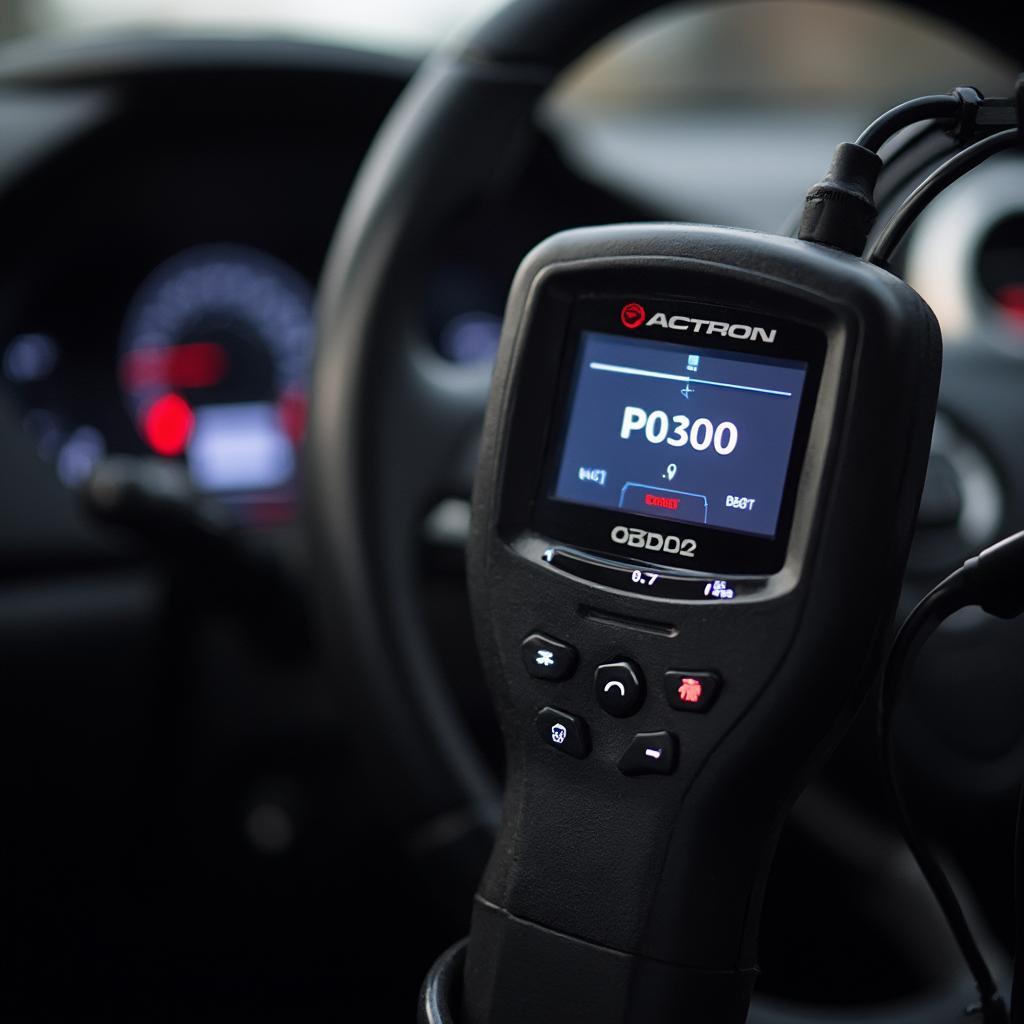The dreaded P0300 diagnostic trouble code, indicating a random or multiple cylinder misfire, can be a real headache. This code is especially common when using Actron OBD2 scanners and understanding what it means is crucial for effective vehicle repair. Let’s dive deep into the Actron OBD2 code P0300, exploring its causes, symptoms, diagnostic procedures, and solutions. obd2 generic dtc definitions
What Does the Actron OBD2 Code P0300 Mean?
The P0300 code specifically signifies a random misfire. This means that the misfire isn’t consistently occurring in a single cylinder, making it more challenging to pinpoint the root cause. The engine’s computer, the ECM (Engine Control Module), detects inconsistencies in the crankshaft’s rotation speed, indicating that one or more cylinders aren’t firing properly. This leads to poor engine performance, reduced fuel efficiency, and increased emissions.
Common Causes of the P0300 Code
Several issues can trigger a P0300 code. Identifying the correct culprit often requires systematic troubleshooting. Some common causes include:
- Faulty Spark Plugs or Wires: Worn-out spark plugs or damaged wires can disrupt the ignition process, leading to misfires.
- Vacuum Leaks: Leaks in the intake manifold or vacuum hoses can disrupt the air-fuel mixture, causing misfires.
- Fuel System Issues: Problems with the fuel pump, fuel filter, or fuel injectors can restrict fuel delivery, resulting in a lean mixture and misfires.
- Low Compression: Worn piston rings, damaged valves, or a blown head gasket can cause low compression in the cylinders, hindering proper combustion.
- Sensor Problems: Malfunctioning sensors, such as the mass airflow sensor (MAF) or oxygen sensors (O2), can provide incorrect data to the ECM, leading to improper fuel mixture control and misfires.
 Actron OBD2 Scanner Displaying P0300 Code
Actron OBD2 Scanner Displaying P0300 Code
Diagnosing an Actron OBD2 Code P0300
Diagnosing a P0300 requires a methodical approach. Here’s a step-by-step guide to help you identify the problem:
- Check for Other Codes: Often, a P0300 code is accompanied by other codes, such as P0301 (cylinder 1 misfire), P0302 (cylinder 2 misfire), and so on. These codes provide more specific information about which cylinders are misfiring. obd2 p0302 code
- Inspect Spark Plugs and Wires: Visually inspect spark plugs for wear, fouling, or damage. Check spark plug wires for cracks, burns, or loose connections.
- Check for Vacuum Leaks: Use a vacuum gauge or a carburetor cleaner spray to check for vacuum leaks around the intake manifold, vacuum hoses, and throttle body.
- Test Fuel Pressure: Use a fuel pressure gauge to verify that the fuel pump is delivering adequate fuel pressure.
- Perform a Compression Test: A compression test measures the pressure in each cylinder. Low compression indicates a problem with the piston rings, valves, or head gasket.
- Check Sensor Data: Use an OBD2 scanner to monitor sensor data, such as MAF sensor readings, O2 sensor readings, and coolant temperature sensor readings. Look for any unusual values that might be contributing to the misfires.
Fixing the P0300 Code
Once you’ve identified the underlying cause, you can take appropriate steps to fix the problem. This may involve replacing faulty spark plugs, repairing vacuum leaks, addressing fuel system issues, or performing more extensive repairs like replacing a head gasket.
What if the P0300 Code Returns?
If the P0300 code returns after repairs, double-check your work to ensure that you’ve addressed the root cause. It’s possible that multiple issues are contributing to the misfires, or you may have misdiagnosed the problem initially.
Preventing the P0300 Code
Regular maintenance is key to preventing P0300 codes. This includes replacing spark plugs and wires at recommended intervals, keeping the fuel system clean, and addressing any vacuum leaks promptly. codes for obd2 pocketscan
Conclusion: Tackling the Actron OBD2 Code P0300
The Actron OBD2 code P0300, representing random misfires, can be a complex issue to diagnose and repair. By understanding the potential causes, following a systematic diagnostic approach, and performing the necessary repairs, you can resolve this problem and restore your vehicle’s performance. Regular maintenance is crucial for preventing future occurrences of this code.
FAQs
- Can I drive with a P0300 code? It’s not recommended to drive extensively with a P0300 code as it can damage your catalytic converter and lead to further engine problems.
- Is P0300 a serious problem? Yes, P0300 can indicate serious underlying engine problems that should be addressed promptly. actron scanner obd2 codes
- How much does it cost to fix a P0300 code? The cost of repair varies depending on the underlying cause.
- Can bad gas cause a P0300 code? Yes, contaminated fuel can contribute to misfires. obd2 pocketscan codes
- Can a clogged catalytic converter cause a P0300 code? While unlikely, a severely clogged catalytic converter can cause back pressure that might contribute to misfires.
For further assistance, please contact us via WhatsApp: +1(641)206-8880, Email: cardiagtechworkshop@gmail.com or visit our office at 789 Elm Street, San Francisco, CA 94102, USA. Our customer support team is available 24/7.